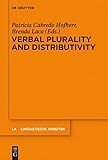Verbal Plurality and Distributivity / ed. by Patricia Cabredo Hofherr, Brenda Laca.
Material type: TextSeries: Linguistische Arbeiten ; 546Publisher: Berlin ; Boston : De Gruyter, [2012]Copyright date: ©2012Description: 1 online resource (225 p.)Content type:
TextSeries: Linguistische Arbeiten ; 546Publisher: Berlin ; Boston : De Gruyter, [2012]Copyright date: ©2012Description: 1 online resource (225 p.)Content type: - 9783110292107
- 9783110293500
- Definiteness (Linguistics)
- Discourse markers
- Grammar, Comparative and general -- Aspect
- Grammar, Comparative and general -- Indirect discourse
- Grammar, Comparative and general -- Numerals
- Semantics
- Distributivität
- Morphologie
- Semantik
- Syntax
- LANGUAGE ARTS & DISCIPLINES / Linguistics / General
- Morphology, semantics, syntax, distributivity, verbal plurality
- P299.D43 V47 2012eb
- online - DeGruyter
- Issued also in print.
| Item type | Current library | Call number | URL | Status | Notes | Barcode | |
|---|---|---|---|---|---|---|---|
 eBook
eBook
|
Biblioteca "Angelicum" Pont. Univ. S.Tommaso d'Aquino Nuvola online | online - DeGruyter (Browse shelf(Opens below)) | Online access | Not for loan (Accesso limitato) | Accesso per gli utenti autorizzati / Access for authorized users | (dgr)9783110293500 |
Frontmatter -- Table of contents -- Authors’ biographies -- Introduction – event plurality, verbal plurality and distributivity -- Nominal and verbal plurality in the diachrony of the Portuguese Present Perfect -- Pluractionality and accompaniment in Cuzco Quechua -- How plural can verbs be? -- Event-Based Additivity in English and Modern Hebrew -- On Distributivity in Karitiana -- Pluractional Verbs: An Overview -- Distributivity is not uniformly over events -- Index
restricted access online access with authorization star
http://purl.org/coar/access_right/c_16ec
This volume brings together novel analyses of verbal plurality and distributivity. The contributions draw on a wide range of new empirical data from languages as diverse as Arabic, Cusco Quechua, European Portuguese, Hausa, Karitiana, Modern Hebrew and Russian. The introductory chapter gives an overview of the central issues that underlie much recent research on the semantics of event plurality. The papers on verbal plurality explore the interaction between verbal plurality and plural arguments in Arabic and European Portuguese, the semantics of additive particles in Modern Hebrew, the semantics of a range of pluractional markers in Cusco Quechua and the morphological variability of pluractional markers cross-linguistically. The papers on distributivity examine the syntax and semantics of reduplicated numerals in Karitiana and adnominal distributive markers. This volume will be of interest to researchers and students in syntax, formal semantics, and language typology.
Issued also in print.
Mode of access: Internet via World Wide Web.
In English.
Description based on online resource; title from PDF title page (publisher's Web site, viewed 28. Feb 2023)


